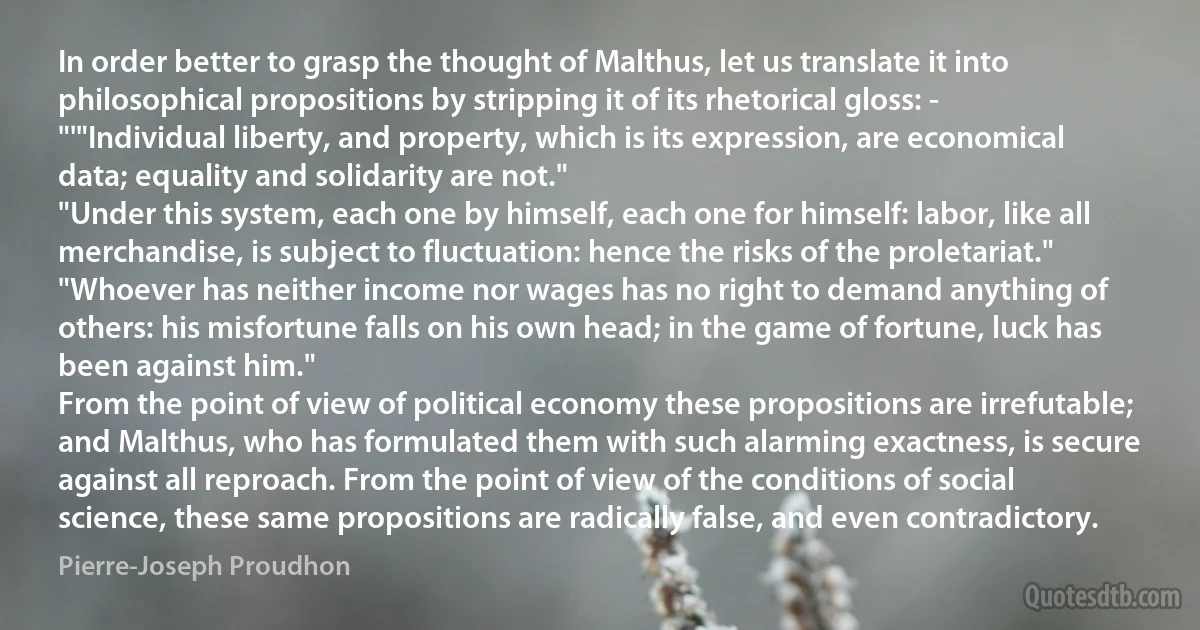
In order better to grasp the thought of Malthus, let us translate it into philosophical propositions by stripping it of its rhetorical gloss: - "'"Individual liberty, and property, which is its expression, are economical data; equality and solidarity are not." "Under this system, each one by himself, each one for himself: labor, like all merchandise, is subject to fluctuation: hence the risks of the proletariat." "Whoever has neither income nor wages has no right to demand anything of others: his misfortune falls on his own head; in the game of fortune, luck has been against him." From the point of view of political economy these propositions are irrefutable; and Malthus, who has formulated them with such alarming exactness, is secure against all reproach. From the point of view of the conditions of social science, these same propositions are radically false, and even contradictory.
Pierre-Joseph ProudhonRelated topics
anything contradictory datum exactness false fluctuation fortune game gloss grasp head labor liberty luck misfortune nor order point proletariat property rhetorical right science solidarity thought translate under view wages others falls malthusRelated quotes
We have entered a time of global transition marked by uniquely contradictory trends. Regional and continental associations of States are evolving ways to deepen cooperation and ease some of the contentious characteristics of sovereign and nationalistic rivalries. National boundaries are blurred by advanced communications and global commerce, and by the decisions of States to yield some sovereign prerogatives to larger, common political associations. At the same time, however, fierce new assertions of nationalism and sovereignty spring up, and the cohesion of States is threatened by brutal ethnic, religious, social, cultural or linguistic strife. Social peace is challenged on the one hand by new assertions of discrimination and exclusion and, on the other, by acts of terrorism seeking to undermine evolution and change through democratic means.

Boutros Boutros-Ghali
I, too, have made a wee-little book from the same materials, which I call the Philosophy of Jesus; it is a paradigma of his doctrines, made by cutting the texts out of the book, and arranging them on the pages of a blank book, in a certain order of time or subject. A more beautiful or precious morsel of ethics I have never seen; it is a document in proof that I am a real Christian, that is to say, a disciple of the doctrines of Jesus, very different from the Platonists, who call me infidel and themselves Christians and preachers of the gospel, while they draw all their characteristic dogmas from what its author never said nor saw. They have compounded from the heathen mysteries a system beyond the comprehension of man, of which the great reformer of the vicious ethics and deism of the Jews, were he to return on earth, would not recognize one feature.

Thomas Jefferson
That spirit I have faith will prevail. America is not going to abandon its principles or desert its ideals. The foundation on which they are built will remain firm. I believe that the principle which your organization represents is their main support. It seems to me perfectly plain that the authority of law, the right to equality, liberty and property, under American institutions, have for their foundation reverence for God. If we could imagine that to be swept away, these institutions of our American government could not long survive. But that reverence will not fail. It will abide. Unnumbered organizations of which your own is one exist for its promotion. In the inevitable longing of the human soul to do right is the secure guarantee of our American institutions. By maintaining a society to promote reverence for the Holy Name you are performing both a pious and a patriotic service.

Calvin Coolidge
Japan had come to terms with Russia because of her difficulties, but this did not mean approval of communism. Communism meant the end of emperor-worship, and feudalism and the exploitation of the masses by the ruling class, and indeed almost everything that the existing order stood for... But communism is the outcome of widespread misery due to social conditions, and unless these conditions are improved, mere repression can be no remedy. There is a terrible misery in Japan at present. The peasantry, as in China and India, are crushed under a tremendous burden of debt. Taxation, especially because of heavy military expenditure and war needs, is very heavy. Reports come of starving peasants trying to live on grass and roots, and of selling even their children. The middle classes are also in a bad way owing to unemployment and suicides have increased.

Jawaharlal Nehru
If you only notice human proceedings, you may observe that all who attain great power and riches, make use of either force or fraud; and what they have acquired either by deceit or violence, in order to conceal the disgraceful methods of attainment, they endeavor to sanctify with the false title of honest gains. Those who either from imprudence or want of sagacity avoid doing so, are always overwhelmed with servitude and poverty; for faithful servants are always servants, and honest men are always poor; nor do any ever escape from servitude but the bold and faithless, or from poverty, but the rapacious and fraudulent. God and nature have thrown all human fortunes into the midst of mankind; and they are thus attainable rather by rapine than by industry, by wicked actions rather than by good. Hence it is that men feed upon each other, and those who cannot defend themselves must be worried.

Niccolò Machiavelli
